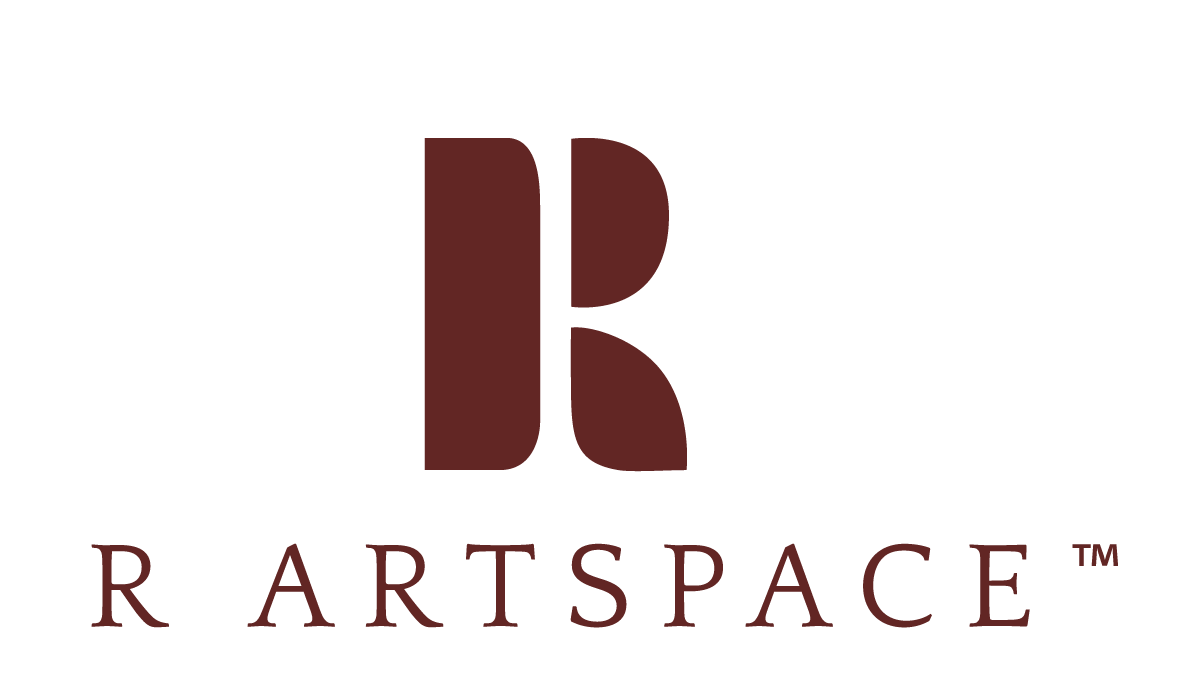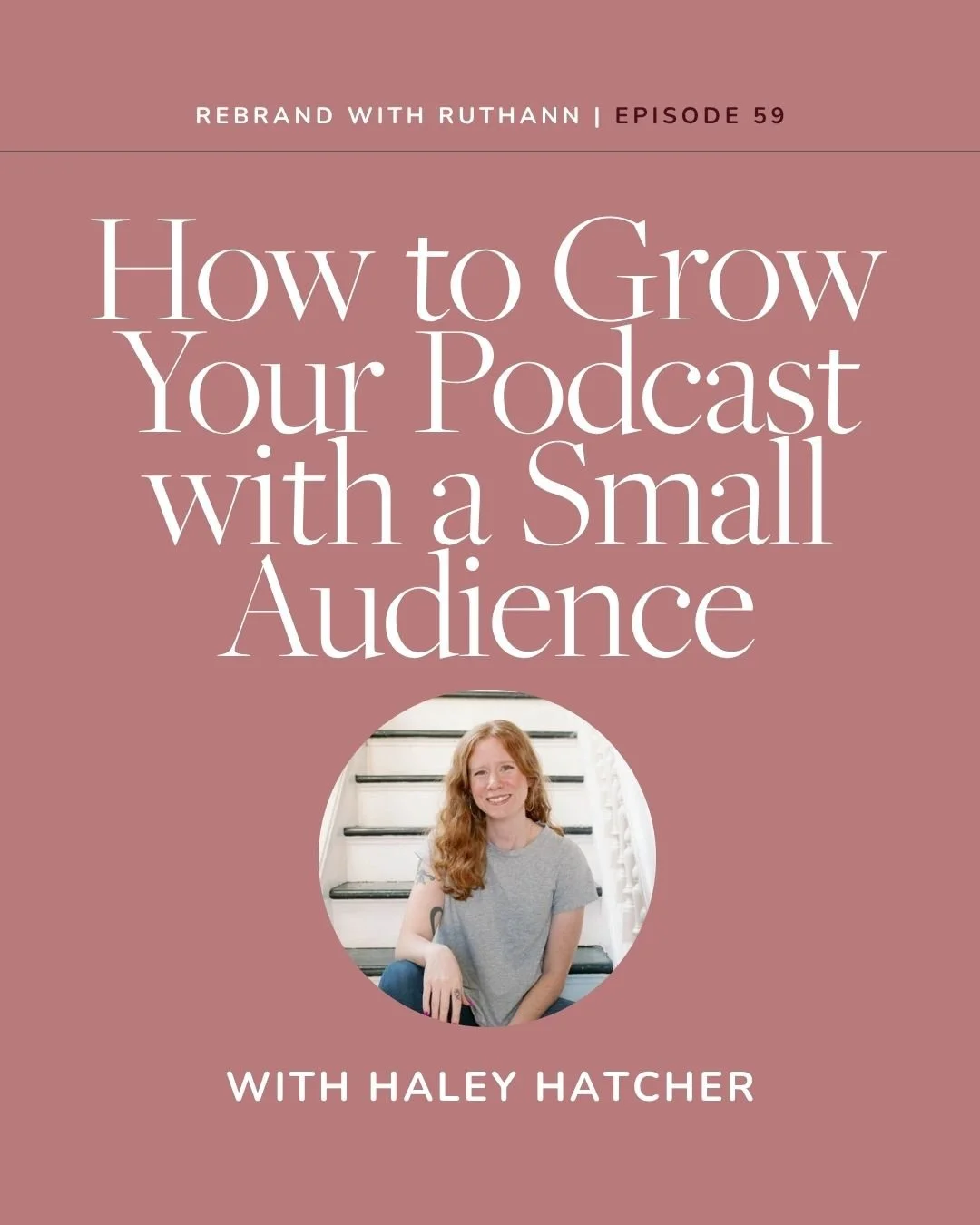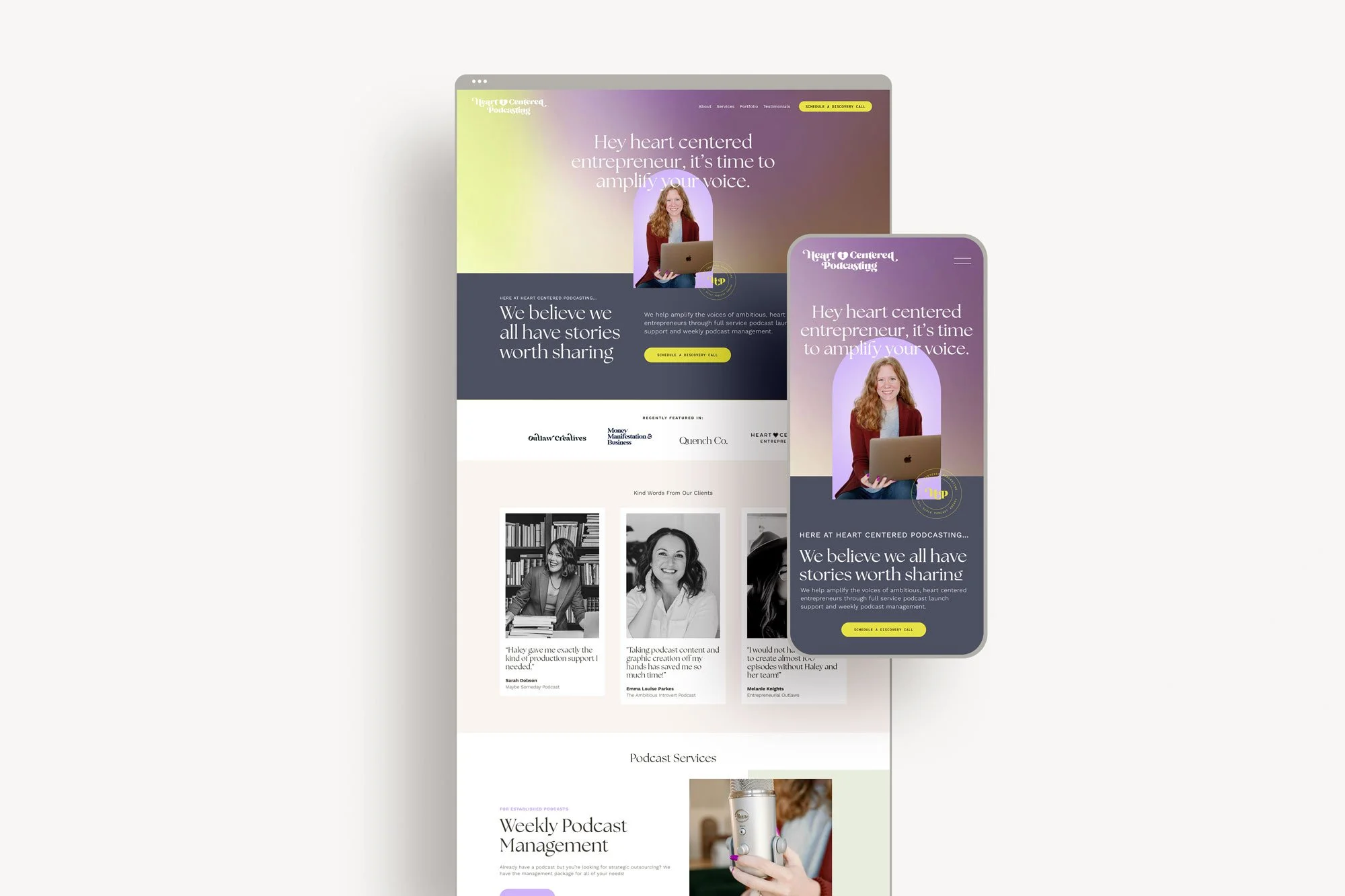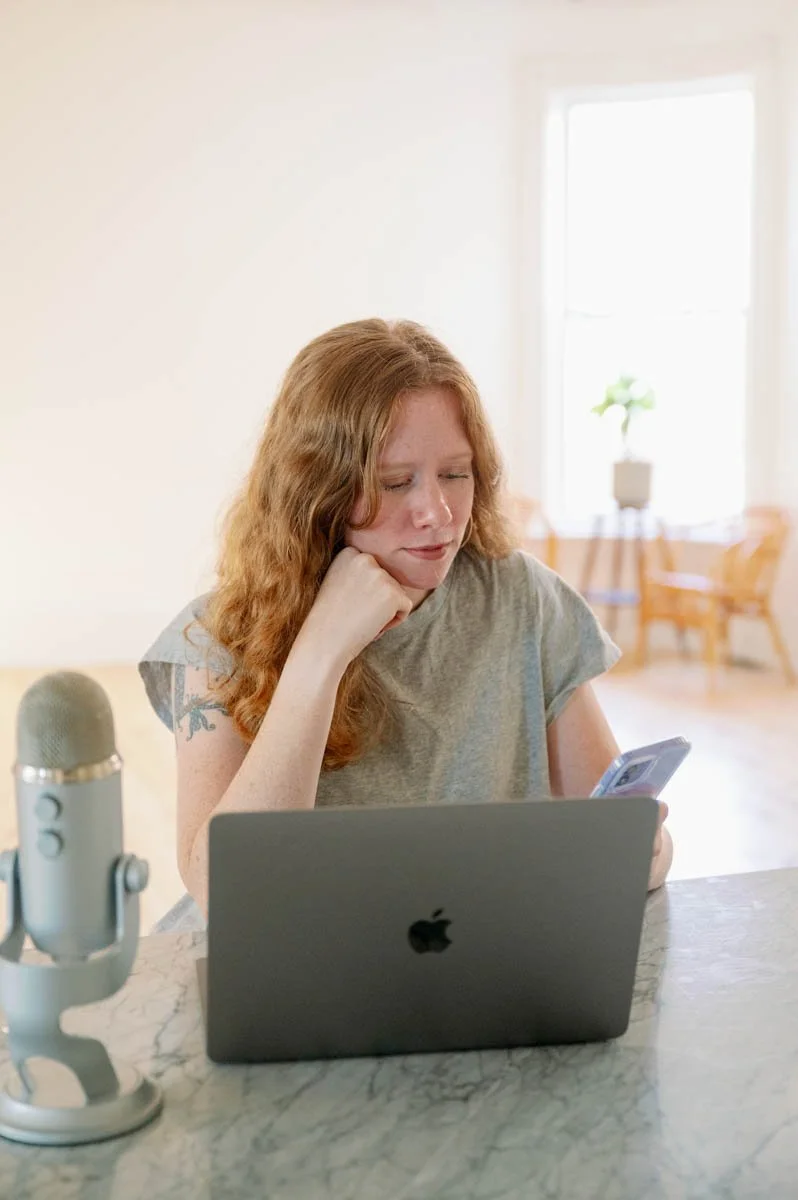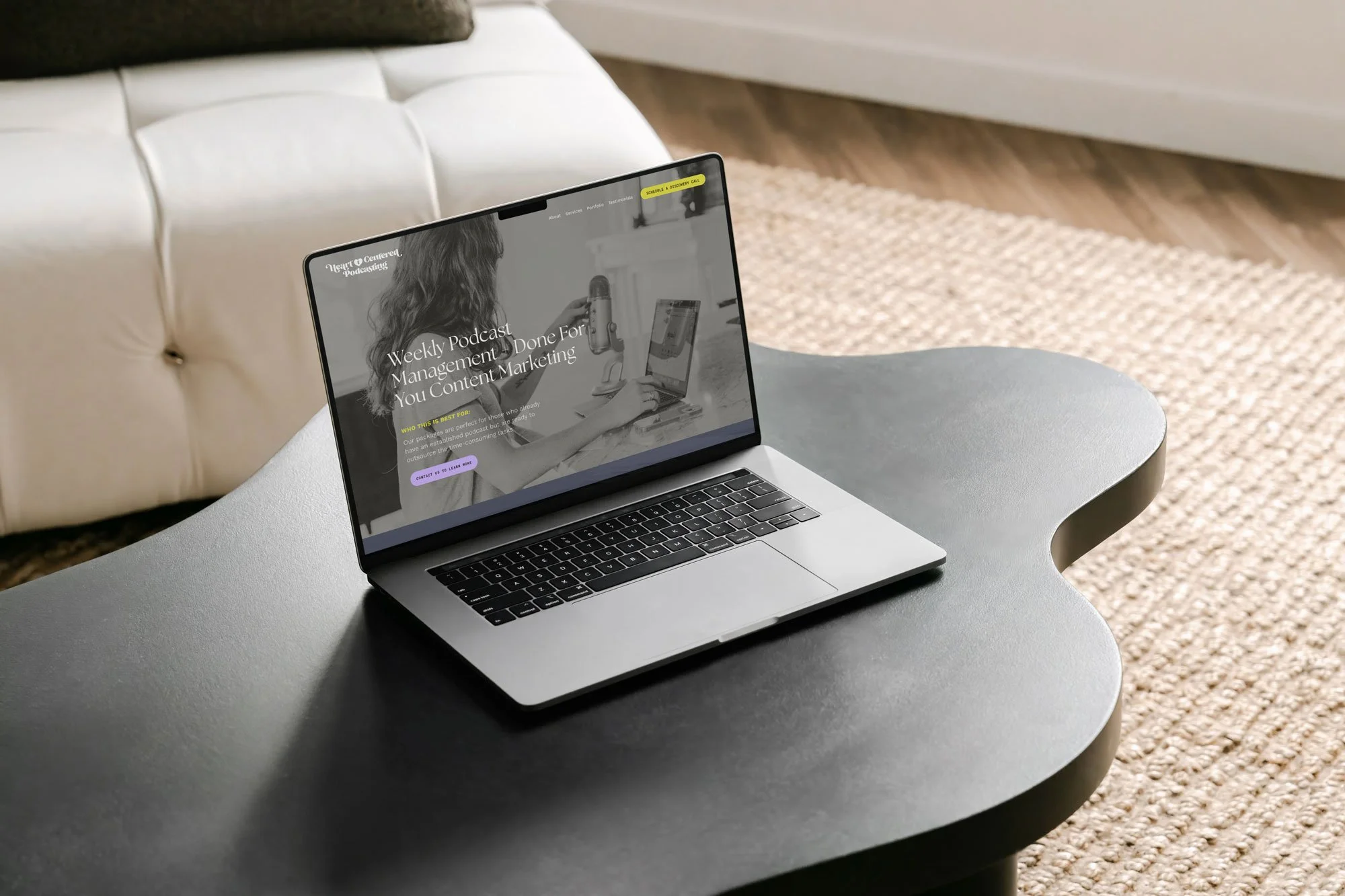How to Grow Your Podcast with a Small Audience: Building a Brand That Attracts Listeners with Haley Hatcher
If you have a podcast, want to start a podcast, or are looking for ways to grow your podcast, this is the episode for you. I sit down with Haley Hatcher, the owner Heart Centered Podcasting, and we discuss all the ways you can grow your listenership if you have a small audience, smart ways to use your podcast to grow your business and website SEO and so much more. Haley is also my client, and I had the absolute pleasure of redesigning her brand and Squarespace website in 2024. Haley shared how her business has grown, as well as her confidence, since we relaunched her website.
Listen now
RuthAnn: Haley welcome to the show! You and I have a history together because you were the podcast producer on my show back in the day. And I also did your rebrand for your brand new website last year. So we have been in each other's lives and businesses and it's just been a joy seeing you grow and stuff. But we are going to talk today a lot about how you've built your podcast agency and how your rebrand has helped you in the process. But before we dive into all that, let's talk about how you got started in your business and kind of the grassroots of that and kind of where you were at when we worked together.
Haley: Yeah, definitely. so I've been podcasting since 2017. I started with a different, online business management agency that offered podcast management as one of their services. And then they actually closed their doors down overnight. So like literally it was overnight. I'm not exaggerating. And so I had a 24 hour window where I was like, okay, I can either go out on my own, start my own company or try to get like a different nine to five jobs somewhere else. And my husband really encouraged me to just try it out, you know, like what could be the worst that would happen. So all that to say when I first started my agency back in 2019, I had zero website, like nothing. Thankfully, you know, I did have a few clients that I brought with me from that previous agency. But in those early days, I was really working with like Canva PDF documents where, know, I would send like a pretty Canva doc of my service offerings to people. But since then I grew, I did make my own website. I DIY'd it, but it got to the point where it didn't feel aligned. My website no longer felt aligned with the level of services that I was offering and like how much my business had grew and the prices that I was charging and I just did not know what was missing. did not know how to get it there and knowing you, it was like such an easy decision to be like, okay, why am I wasting time on this when I can have RuthAnn do this? Because I obviously saw your work with past clients of mine and then producing your show. I'm like, okay, this is a no brainer.
RuthAnn: I love that you DIY'd it in the beginning. And honestly, that’s what I tell people starting out, because so many times you ARE pivoting and figuring things out. Then when you’ve been in business a few years you have a solid idea of how you want to stand out, who your ideal clients are, etc.
Haley: Yeah. And I think, if you remember, like I didn't originally get my website done by you. just did the brand. I guess it would have been the refresh since I already had some branding in place, but then when it became time to like actually implement that branding across my website, I was just like, again, why am I doing this? I don't have time for it. And so I'm so happy that you offer that package because it made it so much easier and so much like just worth the money that I was already investing into it because if I would have tried to do it all on my own, I'd probably still be like tinkering around with my website a year later.
RuthAnn: Okay, you brought up the fact that like you like we did the Brand Refresh first, which is true. And I remember you put the color palette into your site, and I remember going over there and it did look a little DIY and you know, no offense or anything, but it it looked like you had, you know, tried it and you were like, I don’t know why it looks like this, and you said, can you please do this? And I was like Yes. I would be happy to.
Haley: Yeah, yeah, definitely. So I kind of hinted at that with my story into this, but around the time I got my rebrand, I, also introduced new pricing in my business because like spoiler alert, I was undercharging for the services that I was offering, especially because I have a team and I'm paying my team. So it's not just all coming to me. So I have like these. I guess “high ticket” offers and I felt not necessarily, it wasn't like I lacked confidence, but sending out my proposal and then, you know, linking my website with that, or even having this pricing on my website, it just like didn't match. It's people are paying me, you know, a thousand plus dollars a month. And so I want to make sure that what they're seeing before they even know me looks like a business owner who charges a thousand plus dollars a month.
“So when I got that new website, everything felt like so much more aligned and it became so much, there wasn't like no mindset blocks around sending, proposals and contracts out to my clients. And I think it made their decision-making process easier.”
Haley: Obviously I'm not in their heads, but I think it made their decision-making process a little bit easier as well because they see how established I am in the online space because my website, not only does it look great, but RuthAnn also did an amazing job of bringing through my whole client portfolio of past and present clients, as well as my testimonials because I was like sitting on this gold mine of testimonials and I wasn't even using them, maybe like a one-off time in a social post, but they didn't live anywhere on my site. Having those, again, was just more proof to why I charge what I charge.
RuthAnn: I love that you brought up how the client perceives it because I do 100 % think when you look established and professional, they have so much more confidence in working with you and spending a lot of money. Whether it be like a monthly or like a one-off service, I do think it really makes a difference in their comfort level in like investing. so I'm so glad to hear that, you know, it is fully aligned. like you said, you had the testimonials, you have the proof, you have like a beautiful portfolio of work and So you had everything going for you. It was just putting the pieces in place that made it look really good.
Haley: Yeah, and I will say too, like, you know, a lot of my clients are referrals, which is amazing. And I've had people who say, you know, so and so referred me and I saw your website, I looked at the website and I knew right away that I wanted to work with you. And if that was my old website, I don't think that would have happened. And so having that there, it has just made that lead flow for me just a little more smoother and brought in more people that are definitely more aligned. yeah, I don't know. I'm just really thankful for that. And I think it's like the priceless piece of rebranding that a lot of people don't think about.
RuthAnn: Yeah, I do think it is, there's a lot on the back end that a rebrand does for you. It's that peace of mind, it's that confidence, and it's a lot of things that aren't even like tangible that are, you know, outgrowths of a rebrand.
Haley: Something that has really helped is a part of that rebrand process with you was you gave me a few templates, which were great. like all of my launch client templates, most of my testimonial templates, things like that, those were all things that you created for me. And then you also went into my Canva account and you changed my Canva brand kit for me. you, Ruthie Ann puts all of the colors in there for you. She puts in all of your logos, your sub marks, your alternates and my fonts as well. So you make it really easy for me to do that. And I'm someone who, when it comes to design, I'm like very anal and I don't know if that is a good thing or a bad thing, but I'm like, okay, I invested a few thousand dollars into this rebrand. So I am sure is that going to use it because if not, like, what's the point, you know?
RuthAnn: I love that you're using the templates! You mentioned that I went into your Canva and uploaded that. I do love doing that for clients just because it's so easy for them. It's just, if I just do it in Canva, then you have it and then you can use it on your own. So that is something I really enjoy doing and yeah, I'm glad that that was helpful for you in that process.
So I would love to transition a little bit over to your own business and podcasting in particular because we do have listeners who have their own podcast. They're trying to grow their podcast. Maybe they have a small audience. Maybe they are, you know, just seeing how they can use it in their business as an asset. And I would love to hear from your extensive experience, like how like what is some good advice for people if they wanted to grow their podcasts and just encouragement as if they're seeing slow growth?
Haley: Yeah. So one thing I would say like slow growth is the industry standard for podcasting. So I'm sharing a report with RuthAnn called the podcast marketing trends report it is a report that surveys, think two or 300 podcasters and it shows their growth over a whole year, along with different things that they've tried to grow their podcast.
And this report is done every year. And the same thing every year is like good podcast growth is one to 2 % month over month. So that means if you have 50 listeners and you're on your podcast for one month, in the next month, you have 51, like your industry average, you know? So remember that before you get too in your head about it. But, along with that,
And your website having a landing page on your website and having a dedicated blog post for each episode, for your podcast is amazing. A lot of people don't even have that, but having that it's giving Google and SEO more to crawl. So you're going to be able to bring in new listeners that way who maybe have never heard of you. So when you are creating your episodes, be really intentional with thinking about, okay, what are the questions that my listeners are asking? Have that be the basis for your episode and then make sure you're weaving that question along with other tag word. Make sure you're weaving that question along with other keywords into your episode show notes or blog posts and that way, again, when people are typing these questions into Google, your podcast, your episode is popping up right there for them.
RuthAnn: Well, I have to say, I think that's one of the huge things about podcasting that makes it so powerful is that it, especially if you use it on your website like a blog post, having that long form content is a way to grow your website traffic is huge - it lives forever. So you can have people finding your episodes long after you've published it even years later. And I mean, that might not be what people wanna hear that it sometimes can be a year or two or longer, but I think, especially if you're in it for the long run. It's an amazing asset and putting the time in upfront will definitely pay off.
Haley: Yeah. And your point to your podcast is like such an evergreen piece of your work. That is so true. And that's why I always tell people just consistently share your podcast and you don't have to be sharing your newest episode. You can be sharing any episode that makes sense in either with your clients, with people who are asking you questions in your Instagram DMS, or just repurposing.
the content from your episodes or your blog posts, whatever that may be, because no one is going to click on your podcast link and say, well, RuthAnn recorded this episode two years ago, so I'm not going to listen. They're not going to look at that. They're going to look at the topic, see if it's relevant to them. And if it is, then they will listen. And, I think another piece that goes along with that is be really familiar with your podcast data.
“Do what works for you. Maybe looking at those numbers once a month feels good. Maybe looking at them every week feels good, but whatever that cadence is, create a tracking sheet for you and look at those analytics to see which episodes have a lot of traction versus which ones don't because those episodes that are popular, how can you expand on that content?”
Haley
Whether it's through more social media posts about that topic, whether it's creating more episodes that are like offshoots of that topic, whatever that is looking, only way you're to get those answers is if you look at that data and it's, can see, you know, your basic downloads. can see on average how many minutes of your episodes people are listening to. There's just so much to know there when looking at those numbers that it's important to not ignore them altogether, but to look at them and then make informed decisions from them.
RuthAnn: That's so true. Knowledge is power, as I like to say. And I think I have a tendency to not look at numbers because I'm just doing it and right now I'm a one woman show again. So I'm just going at my pace that I have time for. But I think it is so good to keep track of everything, know what's happening. Because then, like you said, you can pivot your content to where it's really resonating and you can get more engagement and more listens and that kind of thing.
So what are some other ways people can use their podcast if they have one in their business and maybe they're just promoting it on, I'm gonna use myself as an example, they're just promoting it on Instagram in their newsletter. What are some other ways they can use their podcast to help their business?
Haley: Yeah. So I think one really cool way is if you have a guest on your show who say, for instance, is a past client, just like, you know, I am RuthAnn’s past client here. She could take tidbits from this conversation where I'm like bragging on her services and she can literally embed that piece of audio right into either her sales page or her testimonials page, wherever that makes sense. using your audio pieces as content to help sell your services and to help prove your services as well is a really great underrated way that people, often forget about using. And it's really good because in your podcast hosts, whether that be, you know, Spotify or bus sprout or whatever it is, they usually have an option where you can embed a player from a certain timestamps.
So at the 10 minute mark or whatever, when RuthAnn and I were talking about her work on my website, she could embed right, right from there and put that in there. she could also just quote me and then say, Hey, to listen to Haley's full story, here's the link to her episode here. So that's one way. And then another way is using either like podcasts, specific links or UTM links.
If you use those in your business and put those links in your show notes, whether you are promoting a service or you're in a launch for say a three day workshop or you're opt-in or anything that would live on your website, make sure that you have a podcast specific link for that so that you can go back and look at that link. You can see how many times that page was viewed, how many conversions there were. That way you have a specific idea of how many people are not only listening to your podcast, but you're converting from your podcast as well, because you can't really measure that directly within your host. So you kind of have to work around that and those, unique links will really help.
RuthAnn: That is such a great idea of bringing a past client’s audio into your like sales page. For instance if I'm showing your website in my portfolio, I could embed your audio from this podcast. That is a wonderful idea! And yeah, thank you so much for that.
Are there any other little tips and tricks you can give someone who's maybe like a seasoned podcaster and they need some fresh content ideas or maybe they're feeling like, should I throw in the towel? Like what would you say to them?
Haley: Yeah, I would say don't throw in the towel. like you said, if you're feeling when you sit down to record and you're feeling just like not that excited to do it, maybe you switch to that season format for a while. Like you did Ruthann and find what cadence works for you. Another thing is if you're having trouble coming up with fresh content, again, look back on those episodes that have performed really well and decide what you can.
Use, from those episodes. And I'm just going to say it, put those episode topics into chat GPT and ask chat like, Hey, my audience loves these episodes. What is related that I can talk about? And then make sure your audience is co-creating with you. Like let them co-create your show with you. So constantly survey them. And when I say your audience, I mean like your newsletter, your Instagram followers, because you don't know specifically who is listening to your show, but you know, ask them like, Hey, I am putting out a podcast episode next week, here are two episodes ideas. Like what would you like to hear or who would you like me to bring on the podcast? Whatever that is, let them feel like they're a part of creating your content with you because then like no brainer they're going to tune in because they felt like they had, they played a part in creating that episode.
RuthAnn: I remember when I, for a year I did that every single week format and it was great and I loved it, but it did get a lot for me just in the season of life with my little kids. And so I did switch to after I took my little nine month hiatus, I came back and I'm doing a bi-monthly cadence and it feels great. So I have like a guest on once a month and then I do a solo once a month and it feels like I can hopefully do this for a little while until my life changes again. But that is kind of the cadence that I found is working. So find what works for you.
So as we are wrapping up, what is something you would say to someone who has a podcast, they have an established business, but maybe they're feeling kind of like you were saying in the beginning, they're feeling like things are not super aligned visually, maybe they are needing something, what would you suggest to them?
Haley: Yeah. I mean, I think the obvious answer here is outsource what you can. and I'm not saying you have to give away your whole production workflow, but bringing someone in at a level that you can afford and that feels ease-filled and aligned can open up so much space for you. And I'm not even just talking about like your time capacity, but also brain capacity as well. Because when you have a partner in the process with you that
You trust their work and you trust their expertise. It just opens up so much more for you so that you can focus on, you know, for example, just the content creation of your show, because the, everything that happens after you record from the editing to promoting the episode are the things that drain you. So, because that's not why you opened your business. That's not why you started a podcast. Right. so I think if you can outsource that.
It will give you so much more freedom to fall in love with your show again and to focus on moving the needle for your business and your audience.
RuthAnn: That is so well said. Please share your services and how people can work with you if they need launch support or ongoing monthly podcast support.
Haley: Yeah, sure. I have a few services. So when it comes to your podcast launch, I have a completely done for you service where we are creating everything that you would ever need for a successful podcast launch. And then I also have a private audio course for you to do if you want to DIY your podcast launch. And then on the management side, I have three different tiers of management offerings right now to help meet you where you're at, not only budget-wise, but with what you are comfortable offloading as well.
RuthAnn: So, so good. And definitely check out Haley on Instagram. You'll love her graphics and everything else that she has going on. and your newsletters are so good every single week. So subscribe for weekly tips and inspiration too!
Thank you so much for being here Haley, this was so much fun.
Haley: Yes, you're so welcome. Thank you for having me.
Did you love this episode? Share it on Pinterest!

